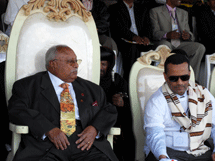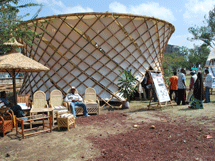[21 March 2011] -- City networks are increasingly becoming recognised as a valuable tool for cities to share knowledge, learn from each other’s experiences and facilitate national dialogue on urban issues.
In Ethiopia, the nascent Ethiopian Cities Network (ECN) is a good example of how cities can work together to fill their knowledge gaps, raise awareness of urban issues and help implement priority reforms in the area of governance, service delivery, urban poverty alleviation and improved housing.
What began as an informal way for Ethiopia’s cities to cooperate and share experiences following decentralisation efforts and rapid urbanisation has become a flourishing network with recognised value for its members and a platform for national dialogue on the urban agenda in Ethiopia.
Since its establishment in 2009 with 19 cities, membership has grown substantially to include 28 cities across the country – most of Ethiopia’s major and secondary cities – and is currently in the process of becoming a legal body.

President Girma Wolde-Giorgis of Ethiopia and Mekuria Haile, Minister of Works and Urban Development, attend Ethiopian Cities Day 2010 in Hawassa. Photo: GIZ
In addition, the network’s activities are becoming increasingly high profile. Its flagship activity, the annual Ethiopian Cities Day, attracted 43 cities in its initial year.The second annual celebrations in 2010 were attended by 80 cities and a high-level government delegation that included Ethiopian President Girma Wolde-Giorgis, a sign of the momentum building around the network.
The ECN is overseen by an executive board elected by mayors of partner cities and is managed by a secretariat that coordinates members’ knowledge needs.
It is supported by the German Agency for International Cooperation (GIZ) as part of its Urban Governance and Decentralisation Programme, the Ethiopian Ministry of Works and Urban Development, and member cities. The Cities Alliance provided funding for the establishment of the ECN and continues to support its ongoing activities.
“The past experience exchange workshops of the ECN have shown great enthusiasm and a positive spirit among cities to assist and learn from each other. -- Tsigereda Tafesse, GIZ
A valuable tool for scaling up sustainable urban reform
Tsigereda Tafesse, Senior Expert and Policy Advisor for GIZ’s Urban Governance and Decentralisation Programme (UGDP) in Ethiopia, notes that the ECN is one of the main tools for ensuring sustainability, improving quality and scaling-up urban reform processes that are already underway in the country. It does this by:
-- Fostering peer-to-peer learning. As a knowledge platform owned by member cities, the ECN allows city administrations to share practical knowledge and work together on solutions for shared challenges. “The practical knowledge of city administration’s day-to- day affairs sits not in the Federal Ministry or in the Regional Bureaus. It is in the city administration itself,” Ms. Tafesse says.“Connecting city administrations with each other, they share experiences and jointly work on solutions to challenges they face. Their comparable framework conditions make the experience exchanges fruitful and adoptable.”
-- Speeding up implementation of reforms. In the past, the national and regional governments were the primary vehicles for supporting cities with implementing reforms in Ethiopia. By allowing cities to exchange innovative approaches and best practices directly, the network alleviates some of the burden on higher levels of government and enables cities to implement reforms faster and more effectively. "Horizontal experience exchange speeds up national reforms in a way traditional top-down approaches could not achieve,” Ms. Tafesse added.
-- Creating a knowledge bank. One of the main challenges in the Ethiopian public sector is high staff turnover, resulting in the loss of knowledge as people leave their offices.The ECN acts as a knowledge bank to store the learning and experience of its members, making the information accessible to everyone – an important element in sustaining the reforms that are underway.
Initial lessons learned
While the ECN is still in its relatively early stages, some initial lessons can be drawn from its establishment and activities over the first two years.
-- Starting informally builds a stronger base. Starting with informal cooperation and experience exchange provides a stronger base for sustainable networking that jumping in with formal structures of a network. In the case of Ethiopia, cities had begun reaching out to each other for knowledge before the network was created.
Decentralisation efforts in recent years meant many local authorities found themselves facing new responsibilities without the experience, capacity or financial means to undertake their new tasks. They also faced a number of challenges, including growing urban poverty and implementing required strategic city plans.
Observing the success of city networks elsewhere in the world, Ethiopian mayors and stakeholders discussed creating an alliance to bridge their knowledge gaps. A number of the cities were already working together in an informal way as part of several large-scale development initiatives, including the World Bank-funded Capacity Building for Decentralized Service Delivery Program (CBDSD) and knowledge exchange activities of the Action Programme 2015, funded by the German government and coordinated by GIZ.
The Cities Alliance subsequently provided funding to establish and institutionalise a formal city network, with co-financing from GIZ, the World Bank, and member cities.
-- The commitment of member cities is critical for sustainability. The commitment and contribution of member cities is a crucial prerequisite for sustaining a city network. Ethiopian cities drove the establishment of the Cities Network, and they continue to have strong ownership of it.
ECN activities, particularly the flagship Ethiopian Cities Day, are garnering more and more attention and attracting greater participation by cities. In fact, cities are covering their own expenses to take part in ECN activities, which is a testament to their draw and perceived value.





